-
 About Us
About Us
About Us
ANANDI in Gujarati signifies Joyfulness and it is our endeavour that all our struggles and work help make this world a joyful place for all. ANANDI’s vision is to bring rural women’s concerns in the centre of all development processes so that all can live in a just, equitable and peaceful society. Values of justice freedom and fraternity guide the mission of promoting women and young leaders to work towards social justice, sustainable development and accountable governance. Building and strengthening rural women led community-based organisations for sustainable livelihoods, rights and entitlements and violence free society for women, youth and children from tribal, Dalit, de-notified tribes and other marginalised communities are core areas of ANANDI’s work since 1995.
ANANDI Technical Support Unit formed in 2017, consolidates its experience and learnings from engagement with diverse communities and stakeholders to institutionalize good practice, knowledge and capacity building. ATSU as part of ANANDI extends technical, knowledge and capacity building support to diverse organisations in gender mainstreaming programs with focus on livelihoods, health and nutrition, women’s empowerment and women’s rights. ATSU is strongly rooted in feminist organising and engages with stakeholders to integrate gender transformative processes in their programs
Our Mission
Advance rights of women who belong to poor rural vulnerable marginalized communities
Intervene in structures/institutions to make them gender responsive and accountable to address inter and intra household inequities.
Our Vision
ANANDI’s vision is to bring rural women’s concerns in the centre of all development processes so that all can live in a just, equitable and peaceful society.
Founder Members
Dr. JAHNVI ANDHARIA
An alumnus of St. Xavier’s College, and TISS Mumbai, India (1987-89 batch), currently based in Delhi. Before setting up ANANDI in 1995 she worked with Mahila Samakhya Gujarat and SPARC in Maharashtra.
MS. NEETA HARDIKAR
An alumnus of M.S. University, Vadodara, India (1988-90 batch), currently based in Devgadh Baria. She worked with Mahila Samakhya Gujarat and Janvikas prior to setting up ANANDI.
MS. SEJAL DAND
An alumnus of M.S. University Vadodara and TISS Mumbai, India (1987-89 batch) currently based in Ahmedabad. After working with Mahila Samakhya Gujarat and Centre for Social Justice she joined in setting up ANANDI.
MS. SUMITRA THACKER
An alumnus of Saurashtra University ( 1980 ) and a fellow with Janvikas is currently based in Rajkot. With a core training in commerce, she was drawn to development work through her work at Mahila Samakya Gujarat and Hind Swaraj Mandal and then joined to set up ANANDI.
MS. PREETI SHETH
An Alumnus of Nirmala Niketan where she did her Masters in Social Work, is currently based in London. Before becoming a founder member of ANANDI, she too worked with Mahila Samakhya and other NGOs and an Internatinal donor organisation.
MS. SHABNAM VIRMANI
She is a founder member of Drishti a development media organisation based in Gujarat. Currently based in Bangalore and involved with using media to take the message of Kabir to diverse audiences.
ADV. BHUSHAN OZA
He is a senior lawyer at Gujarat High Court and has represented several significant and high profile cases seeking social justice.
MR. MAHESH UPADHYAY
He is a social activist and Organizational Development Consultant to new and emerging development groups and human rights organizations.
Board Members
The current Governing Board Members are
| Sr. No. | Name of Member | Address | Age | Occupation | Position |
|---|---|---|---|---|---|
| 1 | Dr. Tara Nair | B- 33, Century Tower, Bodakdev, Ahmedabad | 58 | Professor, GIDR | President |
| 2 | Ms. Sejal Dand | G 203 SAFAL PARIVESH, PRAHALAD NAGAR, 100 FT RING ROAD, Ahmadabad City, Ahmedabad, Gujarat - 380015 | 56 | Gender and Development consultant | Secretary |
| 3 | Ms. Neeta Hardikar | C/o Lataben Baxi, Mitramilan society, Rajmahal Road, Devgadh Baria, Dist Dahod 389 380 | 53 | ANANDI Executive Director | Joint Secretary |
| 4 | Ms. Renu Khanna | C 403 Everest Dignity, Bhayali Bil Road, Vadodara, Gujarat | 68 | Director, Sahaj | Treasurer |
| 5 | Mr. Bhusan Oza | D-42, Takshashila Apts., Vastrapur, Ahmedabad, | 75 | Advocate, Gujarat High Court | Member |
| 6 | Dr.Jahnvi Andharia | K- 19/A First Floor, K Block, Opp. MAAC Animation, Kalkaji, South Delhi- 110019 | 55 | Director and Research Fellow - ISST | Vice President |
| 7 | Ms.Ramilaben Pargi | B-102 Dwarkesh Heights, Nigam Nagar, 44 TP, Chandkheda, Ahmmedabad-Gujarat 382424 | 48 | State Consultant MSS | Member |
| 8 | Dr.Navdeep Mathur | 430, Indian institute of Management, Vastrapur, Ahmedabad | 49 | Professor, IIMA | Member |
| 9 | Ms. Pankti Dattatray Jog | A-302 Swami Narayan App.,Nr. T.V. 9 Channel, Jivraj Park, Ahmedabad- 380051 | 47 | social worker | Member |
| 10 | Ms. Mudita Mahadev Vidrohi | A-2, Kalindi Flats, Nr. Samarpan Flats, Gulbai Tekra, Ellisbridge, Ahmedabad, Gujarat- 380006 | 40 | social worker | Member |
| 11 | Ms. Vibhuti Patel | 310, Prabhu Darshan, 31 Swatntra Sainik Nagar, Amboli, Andheri Railway Station, Andheri (W) Mumbai, Maharastra -400058 | 69 | Educationist | Member |
Awards
Awards Received
- The Time Magazine chose ANANDI as one of its 29 Asian Heroes in the year 2002-2003 for its work in response to the communal carnage of Gujarat in 2002.
- The Vishwa Vatsalya and Sant Bal award Foundation Trust, Ahmedabad, in recognition of the excellent work done by the organisation on building rural women’s’ awareness.
- The Nagardas Doshi Smarak Nidhi Chalala awarded to ANANDI for building rural women’s’ awareness.
- Federation of Gujarat Industries award for Excellence in the field of Rural Development to ANANDI at the hands of Dr. Abdul Kalaam (Hon. Ex. President of India) – 2008
- Young Gandhian’s Award to ANANDI team member for excellent work in rural development – Year 2011
- Ashok Gondhia Awards to the sangathan leaders supported by ANANDI – Years 2006 and 2009
- Police Suraksha Setu – Panchamahaals District for Women’s Empowerment – 2014
- Sitaram Rao Livelihood Case Study Competition 2014 – 3rd Position for the Case “ Sajeev Kheti No Nirdhar Banyo Ajeevika no Adhaar” – “Collective Organic Farming Becomes Livelihood Support”. – Presented at the Access Asia Livelihood Summit – 2014
- મહિલા-યુવતીઓની જમીન માલિકી મિલકત હક - ફિલ્મ- ૨૦૧૯-૨૦૨૦ આનંદી યુવા નેતૃત્વ કાર્યક્રમ અંતર્ગત અમોએ “જગ્યા આપણી જુંબેશ” અંતર્ગત ગત વર્ષ જે 9 ફિલ્મ બનાવેલ, જેમાં શહેરા તાલુકામાં અમે મહિલા ખેડૂત મિલકત હક પર ફિલ્મ બનાવી હતી, આ ફિલ્મમાં બેનો, યુવતીઓ અને એક સરકારી અધિકારીના ઇંટરવ્યૂ પણ લેવાયા હતાં. શહેરા તાલુકાની આ ફિલ્મ હૈદરબાદ ખાતે ડી. ડી. એસ સંસ્થા દ્વારા 3rd (ત્રીજા) ઇન્ટરનેશનલ કોમ્યુનિટી ફિલ્મ ફેસ્ટિવલમાં ઍવોર્ડ માટે નામાંકન મેળવ્યું, જેમાં ટ્રોફી અને પ્રોત્સાહન રૂપે ફિલ્મ ટીમને સર્ટિફિકેટ તેમજ DiGi DSLRકેમેરા આપવામાં આવ્યો.
- Appreciation By the UN World Food Program for ANANDI, RASKUM, Devagadh Mahila Sanfathan and Makaam Supporting the goal of Zero Hunger
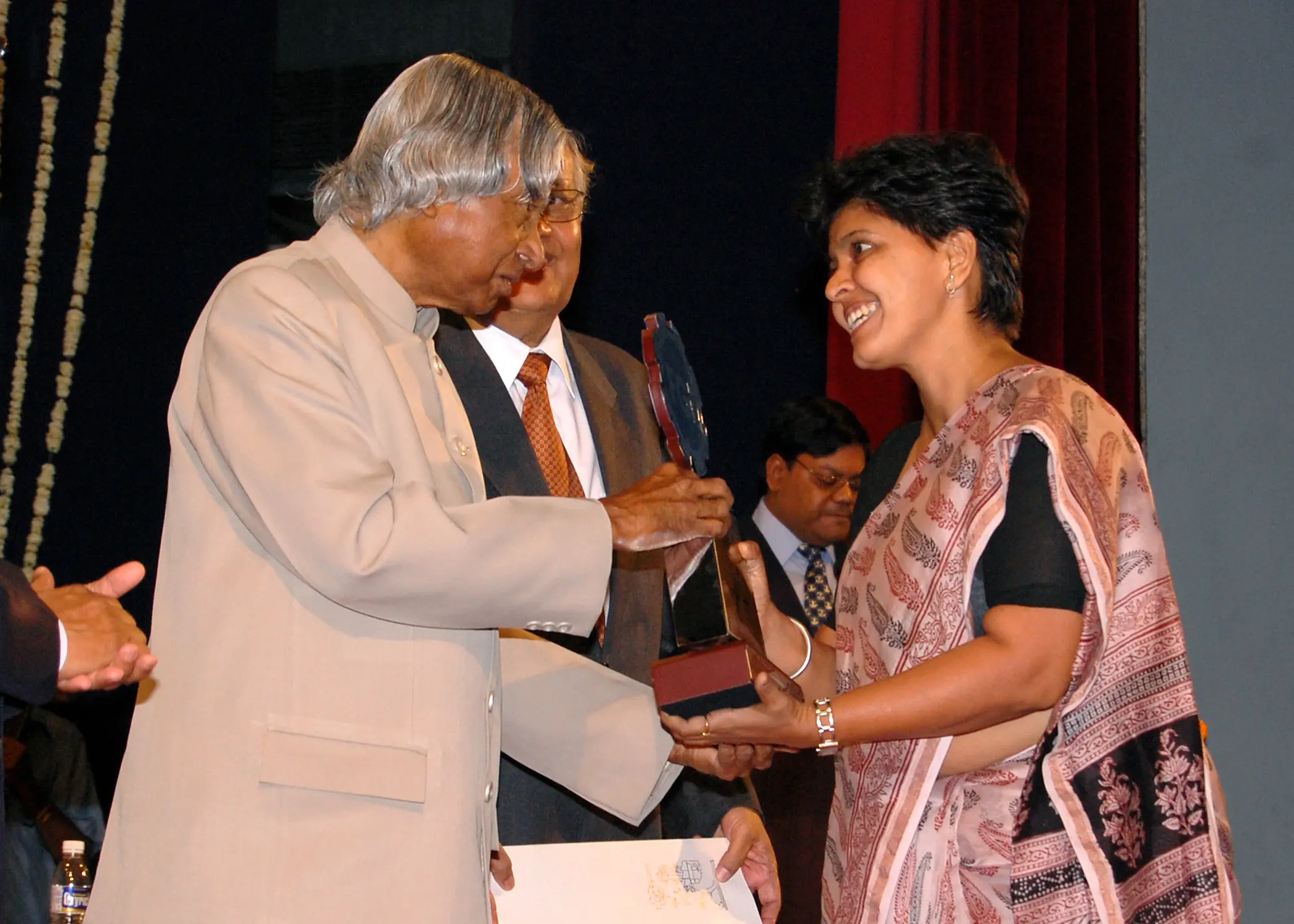
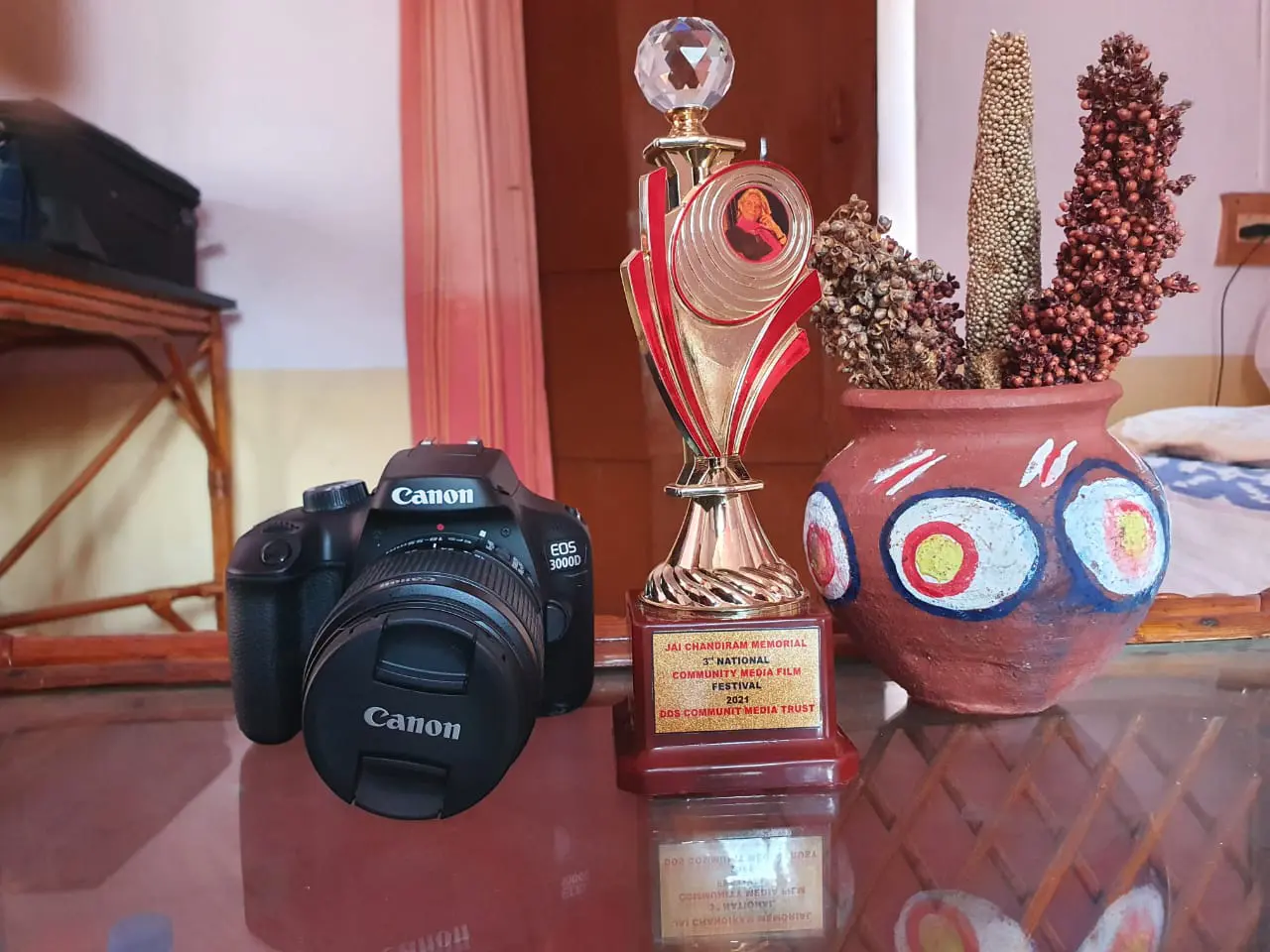
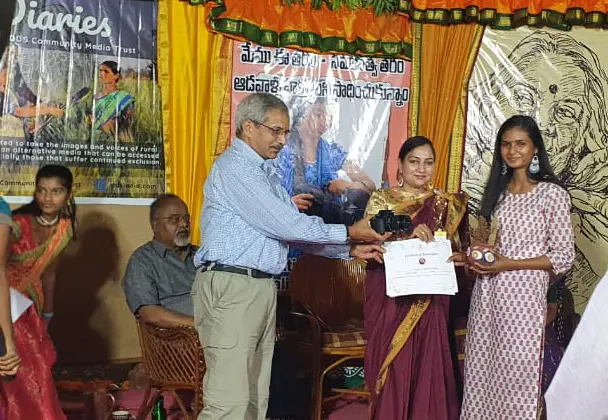
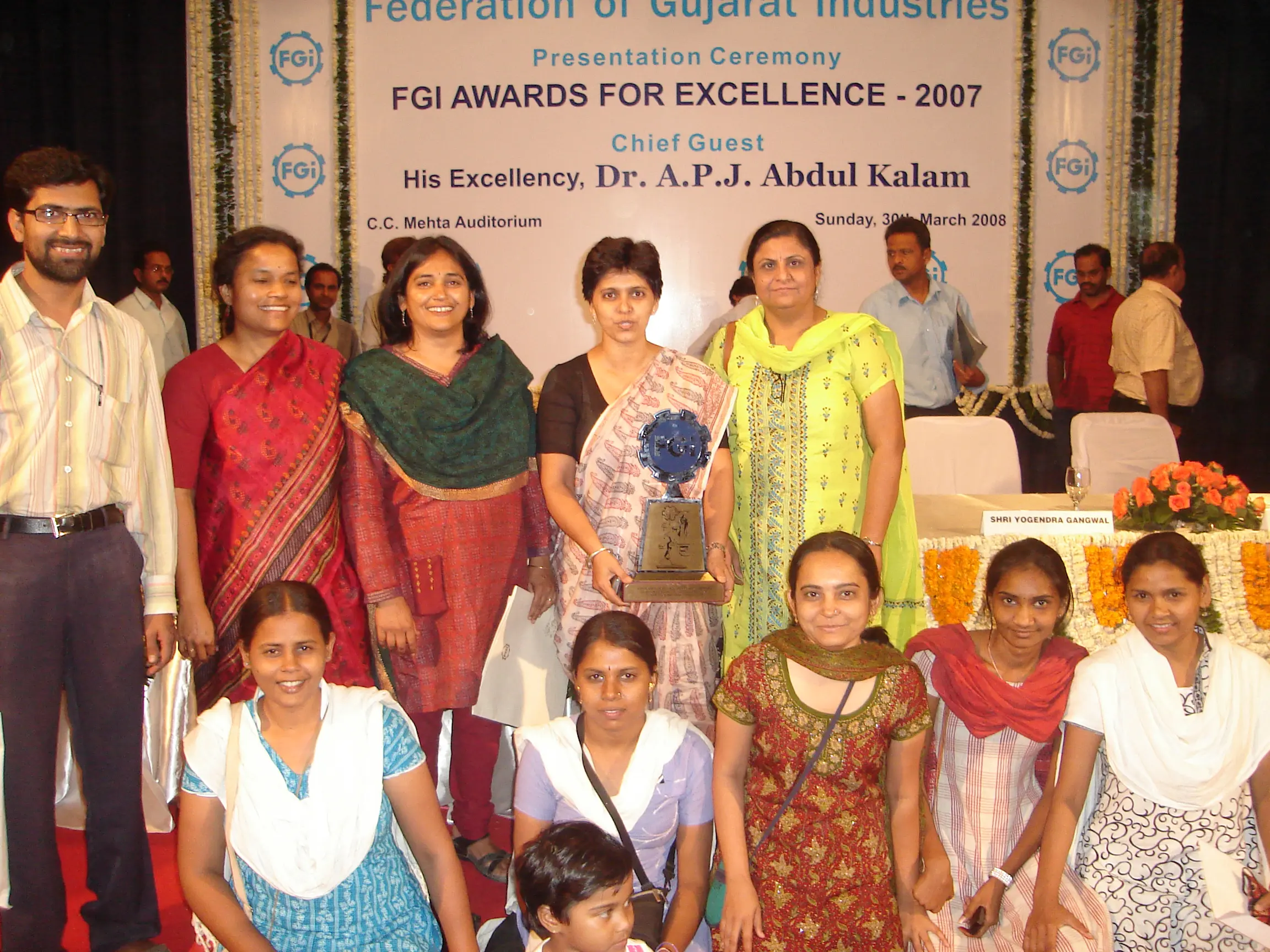
About Our Logo
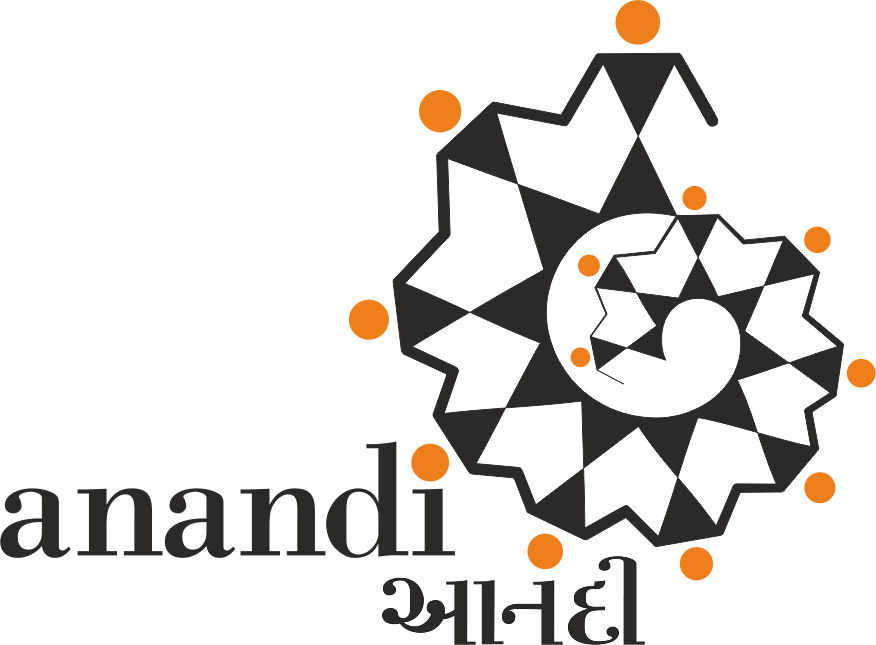
Inspired by the traditional art form of India the new symbol of ANANDI has multiple layers of meanings.
The figures coming together in a Fibonacci’s spiral of life protect an embryo. The spiral that is formed from the logo is the symbol of growth. All life forms in nature grow in that particular spiral shape, be it a twig with leaves or a seashell. The embryo Iike the title signifies — the new dawn for which we are collectively working towards.
The triangles moving both inwards and outwards depict the way Anandi works. We come together with all our energies to spread it out further. The human figures joining hands show the symbiotic relationship we are all in, helping each other grow and prosper.
The symbol signifies that we are a mix not a melting pot. Each of us come together with a varied backgrounds yet do not loose are individuality. In fact our individuality gets highlighted in a group, with multiple talents and capabilities joining force.
The symbol speaks of our vitality and dynamism, the energy of which is felt in the collective struggle to bring a positive change.
Networks and Alliances
- Jan Swasthya Abhiyan
- WGWLO – Working Group for Women and Land Ownership
- WEMAN
- SAFA – South Asian Feminist Alliance
- Dai Sangathan
- Mahiti Adhikar Gujarat Pahel
- Community Action of Nutrition
- PRAVAH
- SHG Equity Group
- MAKAAM - MAHILA KISAN ADHIKAAR MANCH
- ANNA SURAKSHA ADHIKAR ABHIYAN GUJARAT